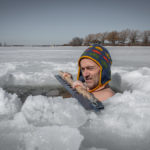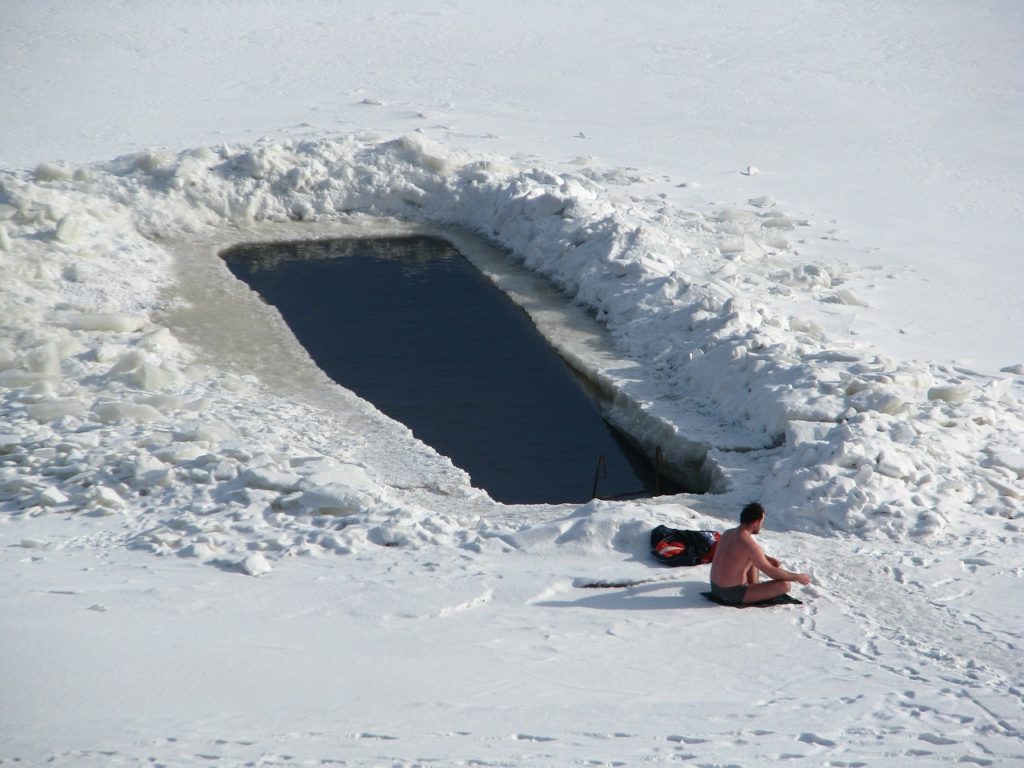The release of season 2 of the Dérives podcast, by Olivier Bernard, is an opportunity to dive back into the excellent season 1. As a reminder, this series investigates a death that occurred during a new-age ritual and analyzes the cultish context around the drama.
But why talk about it on this blog, dedicated mainly to breathing and voluntary exposure to cold?
Certainly, a conscious breathing exercise was involved in the drama described in season 1. But that is not my point. Indeed, the point I want to emphasize is that the practice of voluntary exposure to cold is gaining in popularity. And I’m not complaining. On the contrary. But who says popularity says risk of excess of all kinds. From naive recklessness to mistaken beliefs, accident leading to disaster is possible.
Do you want to start practicing voluntary exposure to the cold?
Perfect. Self-immersion in cold water is surprisingly easier than you might think before you tried it. You still have to be careful not to commit something stupid, or even regrettable. A few tips for getting started are therefore not too much. Here are 12 simple and effective tips from my years of personal practice and teaching. Of course, these tips reflect my “philosophy” around this practice and are binding on me. And of course, they are incomplete. But they are, I think, inclusive enough that most people who want to practice might find them interesting.
1 – Do not hesitate to ask your doctor if you think you have any contraindications: pregnancy, epilepsy, Raynaud’s syndrome (type 2), cold urticaria, sickle cell disease, serious cardiovascular problems, etc. (non-exhaustive list) . Some people shouldn’t be doing this kind of practice all of their life, others should not only part of their life.
2 – Learning about the dangers of exposure to cold is not an attitude of weakness or fear, but an intelligent and respectful attitude towards this practice. In particular, this allows you not to overestimate yourself and to ensure that the experience is well balanced … and therefore successful! A successful experience is more likely to be repeated if desired. Too hard an initiation is more likely to stay in the form of a selfie, like “I did it!” », But without follow-up.
3 – Before testing the full body immersion, take the time to familiarize your cardiovascular system and your nervous system with (very) cold water … in your shower. Finish with 30 seconds of cold water, then 45 seconds, then a minute etc.
Have you validated the first three points? Are you still motivated to try a full immersion? It is time to reflect on the following points:
4 – “We play with the comfort zone, not with the safety zone. “
This is one of the first, and perhaps the most important, teachings I received from my first mentor, Jesse Coomer. It has become a kind of mantra. If there is one important lesson when considering voluntary cold immersion, this is it because it applies to all of the points that follow. Especially if you are looking for a well-being practice.
5 – Find someone to accompany you. Don’t do this alone. When preparing something new, thinking is better when done with people rather than alone. And on the big day, if something goes wrong, it’s obviously better to be able to rely on a someone. Even once initiated, avoid practicing alone.
6 – Optional but possibly game-changing: ask for the help of a coach in voluntary cold immersion. The role of such a coach is of course to manage the logistics (swimming pool, ice, safe natural site …) but also to gain confidence, to explain to you how to proceed before, during and after the immersion. Be careful to find a caring and competent person, who will know how to assess your abilities and your expectations, who will know how to stop you before you go too far while encouraging you to surpass yourself.
7 – A good coach is someone in front of whom your vulnerability (= limits) stands out, but this person should never and in any form take advantage of this vulnerability.
8 – Even if your coach is sympathetic and friendly, etc., he has a position of authority through the “teacher-pupil” relationship. But authority does not have to rhyme with omnipotence: when a coach praises the benefits of a practice, do not hesitate to question this authority. Ask why he / she is telling you this, what are his / her sources etc. Most importantly, if you are using the services of a voluntary cold immersion coach, that authority is expected to focus on, if not limit itself to … voluntary cold immersion.
9 – Cold water immersion coach does not necessarily mean “certified Wim Hof Method instructor”. Of course, this is supposed to provide some guarantee of experience. But voluntary cold immersion is a practice that existed before the Wim Hof Method and will exist after. A good coach can be professional or do it for free, certified in a certain method or not. Of course, experience and qualifications are usually excellent signals, but benevolence and competence, like their absence, can potentially be found everywhere.
10 – Group outings are also great opportunities to motivate yourself, to give yourself courage and can be great moments of conviviality. Be careful, however, not to get caught up in the energy of the group and overestimate your ability. So when going out in a group, go gradually. And if others stay in the water longer than you, good for them. Beware of the ego, which may tempt you to stay a little longer, and a little longer, etc. As a general rule, avoid groups where there is a competitive atmosphere, such as “I am a limitless badass”. This is certainly not desirable either for initiation or for a practice with a view to well-being.
11 – Finally, do not forget to consider in which environment you are going to bathe. Is it in an indoor swimming pool or near a heated room, or even near your home? Or is it in a natural environment, in the middle of the Canadian winter? This changes the precautions to be taken. A competent coach must know how to assess the situation. I wrote a blog post about ice bathing in difficult conditions.
12 – One can have a perfectly peaceful, rich and pleasant life without practicing voluntarily immersion in cold water. This practice can provide valuable support but is not a necessary condition for happiness. You can be a follower of this practice and practice it seriously … but without taking yourself too seriously. It’s always good to ask yourself why are you drawn to this practice (well-being? Surpassing yourself? …). I have observed several times that in some people this practice is associated with a feeling of superiority over non-practitioners. It is a shame at best, but at worst the beginning of a drift towards an exclusive and not necessarily very healthy practice.
In conclusion, let’s avoid season 3 of Dérives dealing with immersion in cold water 😅
🔥❄️🧠✌️
Sebastien.

Sébastien Zappa, PhD
Oxygen Advantage Master InstructorREBO2T – Practitioner
Wim Hof Method Instructor Level 2
ELDOA Practitioner Level 2
Overall Breathing & Cold Geek, Homo cryopulmosapiens…
Happy to coach you since 2018

